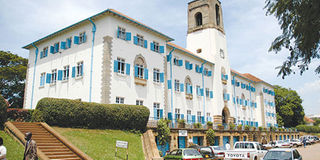Makerere to stop providing food to students

Various students have confessed to being manipulated into paying to get their marks changed and also intimdated into reporting the perpretrators something that is hindering administrators from curbing the vice.
What you need to know:
- Dr. Deus Muhwezi Kamunyu, the Makerere University Academic Staff Association (MUASA) chairperson welcomed the move arguing that if well managed, it would allow the University management to concentrate on decisions that are only related to studies.
- "If the phasing out of meals is the ultimate decision arrived at in consultation with government, I do not see the problem with it. I also think Shs4,000 is very little money for fully sponsored government students because the cost of living today makes it an incomprehensible figure. Contextually, cooking for students should be phased out and replaced by a student self-management programme," said Dr Kamunyu.
Makerere University authorities have unanimously voted to stop providing meals in the halls of residence effective June this year.
The position was reached at a recent council meeting where a report from the Finance and Planning Committee of the University Council presented findings of the survey conducted among students.
Food is given to both government resident and non-resident students. The university says government student total to about 6000 with about 2000 residing at the campus.
Cyriaco Kabagambe, the Dean of Students at Makerere told this reporter that in a survey, over 50 percent of students recommended that the university gives them money to buy themselves food.
Following the Makerere University Council Policy to outsource catering services, the university in August 2014 contracted four firms to provide catering services at six serving centres.
Venus Meas Enterprises was procured to provide food to students in University Hall and Mitchel Hall, while Rema Restaurant and Take Away has been providing food to Nkrumah and Nsibirwa Hall residents. Students from Complex, Lumumba and Mary Stuart Halls of residence have been getting meals prepared by Finaland Bars and Restaurant at Mary Stuart Hall, while Bbosa Institutional Catering Services has been providing food to students in Africa Hall, Livingstone Hall and Galloway House for medical students in Mulago and agriculture students at Kabanyolo Hostel in Gayaza.
Mr Kabagambe said that the contracts for the meal providers are ending by June this year and that the university will not renew their contracts under the current arrangement.
The university has been paying money directly to the companies to provide food to government sponsored students and hall residents since 2014.
Midway, the university was under pressure from the food providers to increase the money paid for each student citing the high commodity prices.
In the contract, service providers have been providing different types of food to students including but not limited to beef, chicken, fish, rice, beans, peas, matooke, sweet potatoes, posho, milk, bread and eggs.
The companies were supposed to provide quality affordable meals to students within the acceptable range of Shs2,000 per meal. Government provides Shs4,000 per day to each student for meals. However, the university says the money is insufficient.
Mr Giftson Kamara, a student residing in Livingstone hall said scrapping off meals for government students shows how the university lacks a complete understanding of what the government students want.
"I have always stood against the scrapping off meals, they should rather improve on service delivery. To me it's an absurd and unreasonable move because they will be exposing their students to health complications given the poor drainage and sanitation in the neighbouring communities," Mr Kamara said.
Kamara wants the university to revise the decision they took arguing it is likely to cause more confusion and strikes among students.
"Will the money come in time so that the students pay where they will be having their meals? We know the delays in the Living out Allowances, internship and this won't be any different," Mr Kamara stated.
Godwin Toko Abunia, a student resident of Mitchell Hall said that the university did not hold conclusive studies among students to come up with that position.
He argues that giving Shs4000 per day for meals to each student is a ridiculous move aimed at starving majority of students who will not afford the current food prices.
The least one can pay for meals at the university's designated food joints is Shs5000. However outside the university, depending on the food joint, food prices range from Shs3,000 to Shs10,000.
Dr. Deus Muhwezi Kamunyu, the Makerere University Academic Staff Association (MUASA) chairperson welcomed the move arguing that if well managed, it would allow the University management to concentrate on decisions that are only related to studies.
Dr Kamunyu however decries the Shs4,000 given to each government sponsored student for meals per day saying it cannot sustain a student in Kampala.
"If the phasing out of meals is the ultimate decision arrived at in consultation with government, I do not see the problem with it. I also think Shs4,000 is very little money for fully sponsored government students because the cost of living today makes it an incomprehensible figure. Contextually, cooking for students should be phased out and replaced by a student self-management programme," said Dr Kamunyu.



